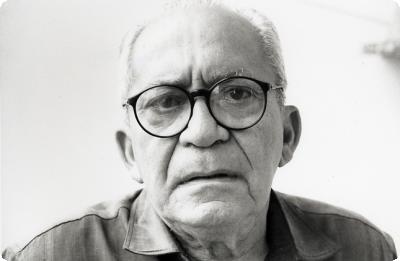Orígenes Lessa (1903-1986)

Another wonderful Brazilian name. Their variety fascinated me. Once when I was living in Rio, I picked up the morning paper (it was the eve of the “New Frontier” in the U.S.) to discover that a pro-American young couple had named their newborn son “João Kennedy,” thinking he needed a middle name they completed it: “João Kennedy Sammy Davis Junior.” I mention this not to jest but because it told me so much about Brazilian culture. My favorite name was Agamemnon Magalhães, distinguished Governor of Bahia and later Minister of State. The Greeks were everywhere in Brazil: Pericles, Orestes, etc.
Orígenes came into my life at a critical moment. I had just published a book in the U.S. about recent Brazilian history. Naturally I was anxious to see it come out in my adopted country. My publisher in the U.S. was Oxford University Press. Their agent in Rio was an ancient German immigrant whom the tropics had not treated well.
I went to my best friend Chico Barbosa who put me in touch with a newly founded left-wing party press with the attractive name of Paz e Terra. They happily said they would be glad to publish it. I consulted my wife who was with me but was also a working girl when back in the States (at MIT). We resolved to pool our modest savings to promote the young professor’s career by buying a new translation. I went back to Chico who said he had just the solution. He was never at a loss (very Brazilian) and said he had a mistress who could do it. She could not really handle it, but she had yet another lover who was, mirabile dicta, Origenes.
So now I was to get a favor (unpaid) from a friend of a friend (friendship is very important in Brazil—country couldn’t exist without it).
Orígenes was an utterly charming friend. We spent two months in my Rio apartment going over the manuscript word for word. He would read out a suggested change and we would quickly agree.
He was an accomplished author who had published a famous short story, “A Feijão e o Sonho” (the “Beans and the Dream”). I asked him how he had learned his American English, and he said he had spent years earning dollars by translating advertising copy for American Airlines! It all turned out well.
Having unloaded several thousand cruzeiros on the incompetent mistress, what did I pay Orígenes? Nada. All done by a friend of a friend (Chico). Friendship (amizade) is very important in Brazil, even if it has to be mediated through a few amorous entanglements.
Now the newly sanitized manuscript was ready to go to press.
The fun came next—the lançamentos (publishing parties) to launch the gringo (and Orígenes) on the Brazilian public.
Further Readings
Lessa, Origenes. O feijão e o sonho: romance. 5.th ed. Rio De Janeiro: Editôra Letras e Artes, 1963.
Lessa, Origenes. O evangelho de Lazaro. Rio de Janeiro: Livraria José Olympio Editora, 1972.
Lessa, Origenes. Seleta de Orígenes Lessa. Rio de Janeiro: Livraria José Olympio, 1973.
Orígenes Lessa was born in Lençois Paulista, São Paulo. After moving to Rio de Janeiro in 1924, Lessa devoted his abilities to writing as a journalist, novelist, and short story writer. His novel O Feijão e o sonho received critical acclaim in 1938. Lessa also wrote popular children’s stories, including Confissões de um vira-lata and Memórias de um cabo de vassoura. In 1981, he became an esteemed member of the Brazilian Academy of Letters.

